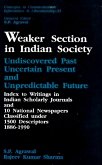In "Revolted Woman: Past, Present, and to Come," Charles G. Harper delves into the evolving identity of women through the lens of history, culture, and anticipated futures. This compelling work marries scholarly rigor with a passionate narrative style, appealing to both academic audiences and general readers. Harper employs a historical framework enriched with cultural critique, exploring the societal forces that have shaped women's experiences across different eras, while also contemplating future possibilities for gender equality and empowerment. The text is peppered with insightful commentary that situates women's struggles within broader social movements, making it a significant contribution to feminist literature. Charles G. Harper, a noted writer and cultural commentator, draws upon his extensive background in sociology and history to inform this thought-provoking exploration. His keen interest in the intersections of gender and social justice has inspired much of his work. Harper's experiences in various cultural settings, coupled with his academic prowess, allow him to weave narratives that resonate deeply with readers, offering a nuanced understanding of women's revolts throughout history and their implications for future generations. "Revolted Woman" is an essential read for anyone interested in feminist discourse, history, and sociocultural dynamics. Harper's articulate and engaging prose invites readers to reflect critically on the progress made and the challenges that remain, urging a collective vision for an inclusive future. This book will undoubtedly stimulate meaningful discussions and inspire action for those committed to advancing gender equity.
Dieser Download kann aus rechtlichen Gründen nur mit Rechnungsadresse in A, B, BG, CY, CZ, D, DK, EW, FIN, F, GR, H, IRL, I, LT, L, LR, M, NL, PL, P, R, S, SLO, SK ausgeliefert werden.









